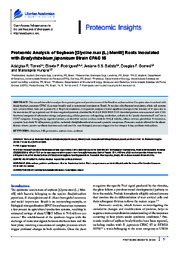Proteomic analysis of soybean [Glycine max (L.) Merrill] roots inoculated with Bradyrhizobium japonicum Strain CPAC 15.
Proteomic analysis of soybean [Glycine max (L.) Merrill] roots inoculated with Bradyrhizobium japonicum Strain CPAC 15.
Author(s): TORRES, A. R.; RODRIGUES, E. P.; JESIANE S. S. BATISTA; GOMES, D. F.; HUNGRIA, M.
Summary: This research intended to analyze the expression pattern of proteins in roots of the Brazilian soybean cultivar Conquista when inoculated with Bradyrhizobium japonicum CPAC 15, a strain broadly used in commercial inoculants in Brazil. At ten days after bacterial inoculation, whole-cell proteins were extracted from roots and separated by 2-D gel electrophoresis. Comparative analysis revealed significant changes in the intensity of 37 spots due to the inoculation (17 up-regulated and 20 down-regulated proteins), identified by MALDI-TOF/TOF-TOF. Identified proteins were associated with COG functional categories of information storage and processing, cellular processes and signaling, metabolism, and also in the ?poorly characterized? and ?not in COG? categories. Among the up-regulated proteins, we identified sucrose synthase (nodulin-100), ?-tubulin, rubisco activase, glutathione-S-transferase, a putative heat-shock 70-kDa protein, pyridine nucleotide-disulphideoxidoreductase and a putative transposase. Proteomic analysis allowed for the identification of some putative symbiotic functions and confirmed the main biological processes triggered in the nitrogen-fixing symbiosis with soybean.
Publication year: 2013
Types of publication: Journal article
Unit: Embrapa Soybean
Keywords: Rizóbio
Observation
Some of Embrapa's publications are published as ePub files. To read them, use or download one of the following free software options to your computer or mobile device. Android: Google Play Books; IOS: iBooks; Windows and Linux: Calibre.
Access other publications
Access the Agricultural Research Database (BDPA) to consult Embrapa's full library collection and records.
Visit Embrapa Bookstore to purchase books and other publications sold by Embrapa.

